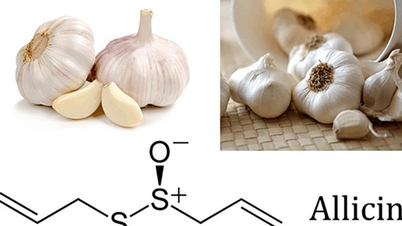Influenza A is a viral illness that often comes on suddenly, with symptoms such as fever, sore throat, nasal congestion, and general fatigue. While there is no cure at home, many natural remedies can help reduce discomfort, support the immune system, and shorten recovery time.
1. Stay hydrated – helps your body fight influenza A
- 1. Stay hydrated – helps your body fight influenza A
- 2. Garlic – 'Golden food' supports immunity
- 3. Zinc – Supports the immune system against viruses
- 4. Get plenty of rest – the key to recovering from the flu
- 5. Salt water – a simple solution to clean the respiratory tract
- 6. Use a humidifier – support breathing in cold weather
- 7. Essential oils – help reduce flu and cold symptoms
The flu can cause dehydration through fever, nasal discharge, vomiting, and diarrhea. Staying well hydrated helps your immune system fight the virus and helps your body recover faster. It also thins mucus, which helps reduce coughs and congestion.
Warm drinks such as herbal tea, honey lemon water, or chicken broth can help soothe a sore throat, reduce chills, and soothe respiratory infections.
In addition, purified water and electrolyte solutions are also essential to replenish lost water and maintain important body functions.
2. Garlic – 'Golden food' supports immunity
Garlic has been used extensively in medicine for centuries, especially to boost the immune system. Many studies have shown that garlic can reduce the risk of illness and shorten the duration of illness, as well as reduce the severity of symptoms.
One particular study showed that aged garlic extract supplements helped reduce the severity of colds and flu by enhancing the function of immune cells, helping the body respond more effectively to viruses.

Garlic, a food that helps relieve symptoms of influenza A.
3. Zinc – Supports the immune system against viruses
Zinc plays an important role in the production of immune cells, which help the body respond more effectively to infections. Zinc supplements are sometimes used to shorten the duration and reduce the severity of viral infections.
A meta-analysis of clinical trials found that zinc helps reduce cold symptoms if taken within 24 hours of the onset of symptoms. However, experts still emphasize that more research is needed to determine the optimal effectiveness of zinc in treating viral infections.
4. Get plenty of rest – the key to recovering from the flu
Getting enough rest when you have the flu helps your immune system work more effectively to fight the virus. Proper sleep and relaxation not only reduces symptoms such as fatigue and nasal congestion, but can also shorten the duration of the illness and help your body recover faster.
5. Salt water – a simple solution to clean the respiratory tract
Saline, or salt water solution, can help relieve discomfort associated with upper respiratory infections; it helps relieve nasal congestion by clearing mucus and allergens, and it keeps the nasal passages moist.
Saline solutions also thin mucus, making it easier to flush out of your nasal passages. You can use a neti pot, squeeze bottle, or syringe to do this. It is important to use a sterile, distilled saline solution to avoid the risk of infection.
Gargling with salt water can help relieve sore throat pain and swelling and help clear mucus. It's simple: Mix a teaspoon of salt in a cup of warm water, then gargle for 10–30 seconds to rinse your mouth and throat. Do this 3–4 times a day for best results.

Zinc supplementation supports immunity, reducing the severity of viral infections.
6. Use a humidifier – support breathing in cold weather
Dry nasal passages in cold weather are susceptible to viruses, and flu viruses survive longer in dry air and spread more strongly. Cold, dry air also aggravates sore throats and nasal congestion.
Using a humidifier helps maintain humidity in the room, reducing dry nose, inflammation and nasal congestion. In addition, you can also place a bowl of water in front of the fireplace; the steam will moisten the air, effectively supporting the respiratory tract.
7. Essential oils – help reduce flu and cold symptoms
Essential oils such as eucalyptus, peppermint (menthol), thyme, lavender, and tea tree can help control flu symptoms and respiratory problems thanks to their analgesic and anti-inflammatory properties.
Taking a warm bath with a few drops of essential oil can help relieve body aches and other cold and flu symptoms. Additionally, adding a few drops of essential oil to hot water and inhaling the steam can help soothe the respiratory tract and relieve nasal congestion.
Please watch more videos :
Source: https://suckhoedoisong.vn/7-bien-phap-tu-nhien-giup-giam-nhe-trieu-chung-cum-a-169251117160159967.htm





































![[Photo] General Secretary To Lam and National Assembly Chairman Tran Thanh Man attend the 80th Anniversary of the Traditional Day of the Vietnamese Inspection Sector](https://vphoto.vietnam.vn/thumb/1200x675/vietnam/resource/IMAGE/2025/11/17/1763356362984_a2-bnd-7940-3561-jpg.webp)













































































Comment (0)